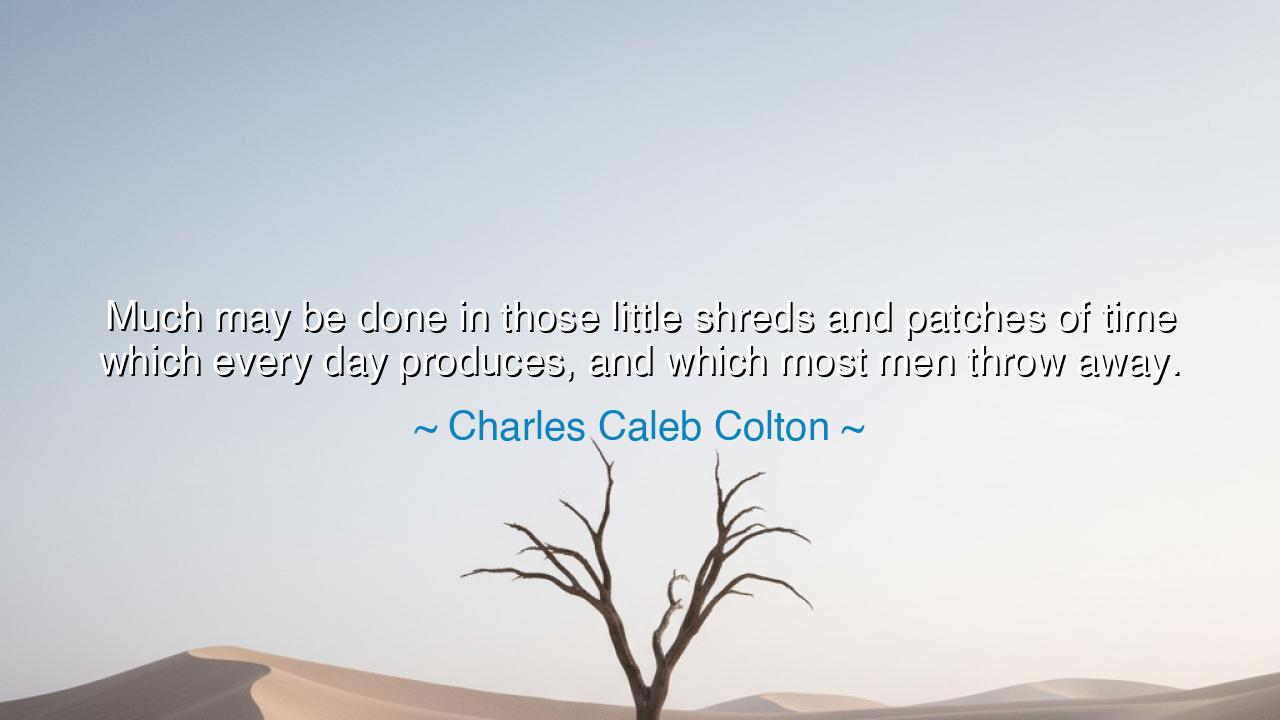
Much may be done in those little shreds and patches of time
Much may be done in those little shreds and patches of time which every day produces, and which most men throw away.






Hear, O seeker of wisdom, the words of Charles Caleb Colton: “Much may be done in those little shreds and patches of time which every day produces, and which most men throw away.” This is no casual observation, but a stern reminder to all mortals that time is the rarest treasure and the easiest squandered. The hours may seem great and obvious, yet it is the little shreds and patches—those unnoticed fragments between duties—that hold the power to shape destiny. Many men cast them aside as trifles, yet the wise gather them as pearls, stringing them into a chain of achievement.
The ancients understood this law of life. They knew that victory is not won in a single stroke, but in countless small moments of preparation. The sculptor does not hew a statue in a day, but in patient chips and measured cuts. The scholar does not master wisdom at once, but in brief passages of study, stolen between the labors of the day. To waste the shreds of time is to abandon greatness; to use them is to rise above the common lot.
Consider the tale of Benjamin Franklin. Born with little wealth, tasked with hard labor from his youth, he might have despaired at the scarcity of hours for learning. Yet he gathered the patches of time—moments before dawn, minutes stolen at the printing press, intervals between tasks—and used them for study. He read, he wrote, he experimented. By piecing together the fragments of the day, he wove a tapestry of wisdom that carried him to renown as a statesman, inventor, and philosopher. His life is living proof of Colton’s teaching.
Or think of the Roman general Scipio Africanus, who in youth spent every idle hour in study of the art of war. While his companions wasted their leisure in games and revelry, he gathered his shreds of time into a treasury of skill. Thus, when the call came to face Hannibal, he was ready, not because fortune favored him, but because he had made use of hours that others had thrown to the wind. His greatness was built in fragments, and those fragments became victory for Rome.
The meaning of this wisdom is clear: it is not only the great blocks of time that matter, but the small ones. For many complain, “I have no leisure to pursue my dream, to read, to create, to grow.” Yet they let slip countless minutes between tasks, countless moments before rest, countless intervals that could have borne fruit. To lament the lack of time while discarding its fragments is as foolish as starving while scattering crumbs.
Therefore, let this be the lesson: seize the shreds and patches of time. Do not despise the small beginnings, for they build the great endings. If you desire wisdom, read a page in the pause of the day. If you seek strength, practice in the brief interludes of leisure. If you long for greatness, gather each fragment of time and spend it as if it were gold. For the fragments, wisely used, will become foundations.
Practical counsel stands before you: Keep a small book in your hand to read when you wait. Write a line of thought while others chatter idly. Offer a kind word in the brief encounter with a stranger. Do not waste the morning minutes on aimless distraction, nor the evening moments in idle complaint. Turn the patches of time into seeds, and they will grow into trees of accomplishment.
So take Colton’s words to heart: “Much may be done in those little shreds and patches of time.” Gather them, treasure them, and let no day’s fragments be lost. For the multitude squander them, but the wise shape them into eternity. And in the end, it will not be the hours you commanded, but the fragments you redeemed, that carve your name into the memory of men.






AAdministratorAdministrator
Welcome, honored guests. Please leave a comment, we will respond soon